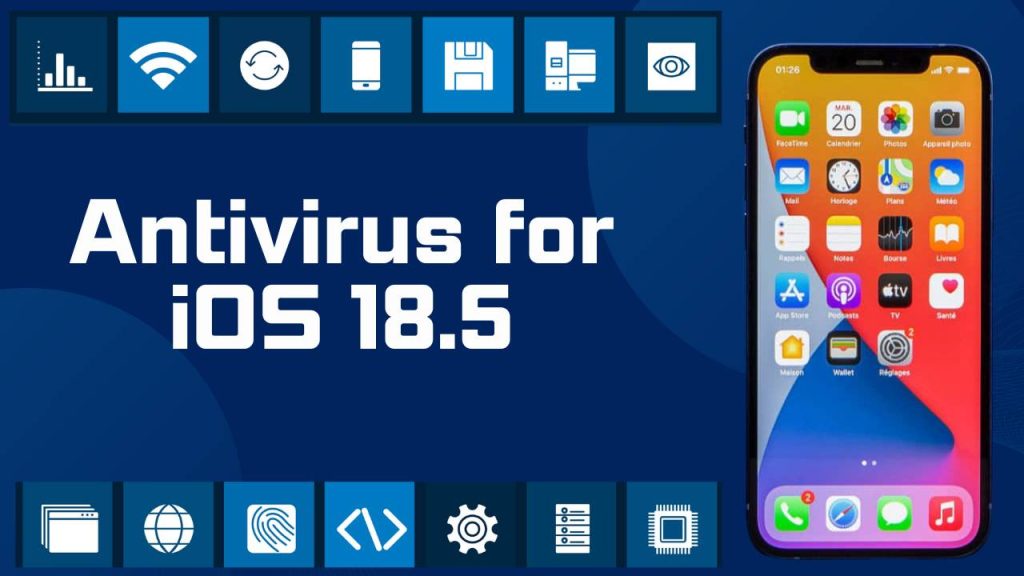With the release of iOS 18.5, Apple has introduced enhanced security features to protect users from malware, phishing attacks, and other cyber threats. No system is entirely immune to risks, making antivirus for iOS 18.5 a valuable consideration for added protection. While iOS is known for its robust security architecture, third-party antivirus apps can provide additional layers of defense, especially for users who frequently download apps, browse suspicious websites, or handle sensitive data.
iOS 18.5 Update Warning: Display Glitches, Black Screen & How to Fix Them
Best iPhone Security Apps for iOS 18.5: Free & Paid Picks
Here, are the best antivirus apps for iOS 18.5, along with their pros and cons, to help you decide which one suits your needs. We’ll also discuss why antivirus protection is still relevant for iOS and whether free options provide sufficient security.
Why Do You Need Antivirus for iOS 18.5?
Even though iOS 18.5 continues Apple’s tradition of strong system-level security and sandboxing architecture, modern digital threats have evolved to target even the most secure platforms. Here are the key reasons why having an antivirus app is still important for iOS 18.5 users:
1. Phishing Protection: More Than Just Safari Safeguards
Apple’s Safari browser includes smart fraud detection and tracking prevention, but phishing techniques have become much more complex and deceptive. Cybercriminals often disguise malicious links in emails, text messages, or social media apps, impersonating legitimate sources such as banks, shopping portals, or even Apple itself. These links can lead to convincing fake login pages that steal credentials before users realize it’s a scam.
A good antivirus app enhances your protection by integrating advanced URL filtering, real-time link scanning, and smart alerts across multiple apps—not just Safari. It can scan incoming links in emails, messengers, and social media apps, giving users early warnings before interacting with risky websites.
2. Wi-Fi Security: Protection Beyond Your Home Network
Although iOS 18.5 encrypts much of your data automatically, when you’re on a public Wi-Fi network—such as in airports, hotels, coffee shops, or libraries—your connection can be exposed to man-in-the-middle attacks and packet sniffing. Hackers can intercept unprotected traffic and gain access to sensitive information like passwords, credit card details, and personal emails.
Top antivirus solutions now include built-in VPN (Virtual Private Network) services that encrypt all internet traffic in real-time, regardless of which app you’re using. These VPNs create a secure tunnel between your device and the web, shielding your data even on insecure networks. Some also auto-activate the VPN when you’re on an unsecured Wi-Fi network, adding hands-free protection.
3. Malware Risks: Low, But Not Nonexistent
Many users believe iOS is immune to malware, but that’s a dangerous misconception. While rare, iOS malware does exist, especially through side-loaded enterprise apps, malvertising (malicious advertising), and jailbreak vulnerabilities. Malicious profiles and rogue configuration settings can also compromise security settings without user consent.
Top Paid Productivity Apps for iOS 18.5 That Are Worth It
Antivirus apps for iOS 18.5 come with malware scanning tools, app behavior analysis, and protection against configuration profile exploits. They help detect and block harmful content before it affects your device and notify you if a known threat is detected from sideloaded apps, websites, or suspicious iMessages.
4. Data Privacy: Monitoring Your Digital Footprint
As more of our lives move online, personal data becomes increasingly vulnerable. Even legitimate apps may overreach their permission boundaries, accessing contacts, camera, microphone, or location unnecessarily. Meanwhile, data breaches and leaks can result in your personal information ending up on the dark web.
Many iOS antivirus tools now come with privacy auditing features that review all installed apps for excessive permissions and risky behaviors. In addition, they offer identity theft monitoring, dark web scanning, and breach alerts, so you’ll know instantly if your email address, passwords, or other sensitive data have been exposed in a breach. Some even suggest actions to recover or change compromised credentials.
5. Anti-Theft Features: Extra Help If Your Device Is Lost or Stolen
While iOS 18.5 includes Find My iPhone, it doesn’t offer the complete suite of anti-theft tools that third-party antivirus apps do. These security apps provide enhanced remote management features, such as triggering a loud alarm, taking a photo with the front camera when someone tries to unlock your phone, tracking its real-time movement, and even performing a remote wipe to safeguard your data in extreme cases.
These tools are invaluable not just in the event of theft, but also when you misplace your phone in a public place or at home. Some antivirus apps even allow SIM change alerts or lockout protection to notify you if someone tries to tamper with your device.
Top Antivirus Apps for iPhone Running iOS 18.5
Each of these antivirus apps has been tested and verified to support iOS 18.5, and each brings unique advantages for different types of users.
1. Norton Mobile Security
Norton Mobile Security is widely regarded as a premium security solution for iOS devices. It provides layered protection against phishing, unsecured Wi-Fi, and identity theft. Designed specifically with real-time threat intelligence and seamless iOS 18.5 compatibility, Norton offers users peace of mind whether they’re browsing, shopping, or accessing public networks. It operates quietly in the background while actively scanning for online threats.
Pros:
- Wi-Fi Security Scanner: Norton scans both existing and new Wi-Fi networks for vulnerabilities. It checks for unusual routing activity, ARP spoofing attempts, and unencrypted traffic, alerting you before your data is compromised.
- Web Protection in Safari and Chrome: Not only does Norton block known phishing links, but it also uses a cloud-based threat detection system that updates in real-time, making it reliable against zero-day web attacks.
- Dark Web Monitoring: Unlike many competitors, Norton offers deep-web surveillance, scanning underground marketplaces for your credentials, including emails, passwords, and even address information if tied to known breaches.
- Device Security Alerts: Norton actively monitors your iOS security posture, alerting you when your system is outdated, improperly configured, or if suspicious settings (like profiles or certificates) are installed without consent.
Cons:
- No file-level virus scanning: Due to Apple’s sandboxing, Norton can’t scan internal app files, limiting its malware detection to network-based threats and system anomalies.
- Requires annual subscription: While $29.99/year is competitive, there’s no permanent free plan, and some users may prefer a free alternative for basic use.
- Limited offline protection: Features like breach alerts and real-time web scanning require constant internet access, so offline defense is minimal.
Best For:
Frequent travelers, financial app users, and professionals who need reliable, real-time online threat protection without compromising performance.
2. McAfee Mobile Security for iOS
McAfee Mobile Security offers one of the most feature-rich antivirus experiences on iOS 18.5. It combines identity protection, privacy defense, and media encryption into a unified app. Whether you’re protecting sensitive photos or browsing on public Wi-Fi, McAfee has tools tailored for both casual and professional use. Its real-time alerts and integrated VPN make it suitable for data-sensitive tasks.
Pros:
- Secure Media Vault: This encrypted vault uses Face ID, Touch ID, or PIN access to protect photos and videos. It ensures private content remains hidden even if your iPhone falls into the wrong hands or gets compromised remotely.
- Wi-Fi Guard and Safe Browsing: McAfee monitors for network-based threats like rogue access points or DNS spoofing. Its Safe Browsing tool blocks dangerous URLs across multiple browsers, not just Safari.
- System Security Scan: Regular scans ensure your iOS is free from unwanted profiles, jailbreak indicators, and third-party tampering, helping maintain device integrity.
- Identity Protection Suite: Provides comprehensive monitoring of your digital identity, including email leaks, dark web mentions, and even financial data like credit card numbers and SSNs (U.S. only).
Cons:
- Moderate battery usage: Always-on VPN and system monitoring can lead to noticeable battery drain, especially on older iPhones.
- Free version is limited: Most of the powerful tools, including VPN and ID monitoring, are locked behind a premium paywall.
- Can be intrusive: The app pushes frequent upgrade prompts and promotional pop-ups, which may disrupt the user experience.
Best For:
Business users, content creators, and security-conscious individuals who require encrypted storage and identity monitoring.
3. Avast Security & Privacy
Avast offers a lightweight and beginner-friendly antivirus app tailored for casual iPhone users. Though it doesn’t pack every advanced feature, its clean interface and core tools make it a great starting point for those new to mobile security. Avast for iOS 18.5 focuses on Wi-Fi security, identity protection, and media privacy, with optional premium upgrades for more comprehensive coverage.
Pros:
- Wi-Fi Inspector: Detects open networks, outdated encryption (WEP, WPA), and rogue devices sharing the same network. Ideal for users who connect to unfamiliar hotspots regularly.
- Identity Protection: With one tap, you can register multiple emails for breach monitoring. Avast notifies you if your credentials are found in leaked databases, allowing prompt action.
- Photo Vault: Stores selected photos in a biometrically locked vault, offering an additional layer of protection beyond Apple’s Photos app.
- Intuitive Design: Everything is explained with visual cues, tooltips, and walkthroughs, making it accessible for even the least tech-savvy user.
Cons:
- Web shield in free version is basic: Advanced phishing protection, browser filtering, and VPN are premium-only features.
- Persistent ads: Free users will experience ads and upgrade nudges, which can disrupt the otherwise smooth experience.
- No real-time antivirus scan: Like most iOS antivirus apps, Avast cannot scan installed apps or files due to Apple’s sandbox restrictions.
Best For:
First-time antivirus users, students, or casual users who want basic protection and privacy features in a simple, easy-to-use package.
4. Lookout Mobile Security
Lookout combines traditional antivirus protection with advanced tools for device recovery and identity theft mitigation. With a clear focus on breach detection, phone tracking, and stolen device recovery, it provides real value for users concerned about physical loss or personal data leaks. Lookout supports iOS 18.5 with enhanced system security and real-time data alerts.
Pros:
- System Advisor: Detects any security configuration changes, unauthorized profiles, or jailbreak attempts. This ensures that the iOS system remains uncompromised and compliant with security best practices.
- Breach Report Notifications: Monitors widespread leaks from services like banks, retailers, and government portals, helping you act quickly if one of your accounts is affected.
- Lost Device Protection: Goes beyond “Find My iPhone” by enabling remote lock, custom messages, high-volume alarms, and photo-capture of unauthorized access attempts.
- Identity Theft Insurance: U.S. premium users get financial coverage and expert restoration services in the event of verified identity theft, which adds monetary value to the protection.
Cons:
- Premium paywall: Identity monitoring, theft protection, and insurance are only available with paid plans, limiting functionality for free users.
- Dated interface: The UI, while functional, lacks the modern polish of newer security apps, making it feel a bit behind visually.
- Country limitations: Identity theft insurance is U.S.-exclusive, which limits the app’s full utility for global users.
Best For:
Travelers, students, and identity-conscious users who want to secure their device and receive compensation in case of serious data theft.
5. Bitdefender Mobile Security
Bitdefender is known for quietly effective protection, and its iOS version is no exception. With a minimalist design and focus on web security and account protection, Bitdefender fits those who want to avoid app bloat. While its iOS 18.5 app isn’t as feature-heavy as on Android, it still provides excellent network scanning, email breach monitoring, and a lightweight VPN.
Pros:
- Web Protection Engine: Actively blocks phishing, scam, and malware-laced URLs across all browsers. Ideal for users who frequently shop or conduct financial transactions online.
- Account Privacy Checker: Lets users monitor multiple email addresses for leaks. You get notified not just of the breach but also of which service was compromised and when.
- Lightweight VPN: The 200MB/day of encrypted traffic is perfect for quick sessions like banking, checking sensitive work emails, or making online payments on the go.
- Minimal Resource Use: Bitdefender runs in the background with almost no impact on CPU or battery, making it great for performance-focused users.
Cons:
- VPN data limit: Power users will exhaust the free VPN quota quickly, and unlimited data requires a separate paid upgrade.
- No app locking or photo vault: Compared to Avast or McAfee, Bitdefender lacks multimedia privacy tools, limiting its scope for content protection.
- Fewer tools overall: It skips system analysis and device recovery features, focusing instead on web and identity protection only.
Best For:
Minimalists, privacy advocates, and professionals who prefer quiet, resource-efficient protection without unnecessary clutter.
Whether you store business documents, browse sensitive data, or simply want peace of mind, these apps will help keep your iPhone running iOS 18.5 safe, private, and secure.
FAQs
1. Do iPhones running iOS 18.5 really need antivirus apps?
Yes, while iPhones are considered highly secure due to Apple’s sandboxing and system-level restrictions, antivirus for iOS 18.5 adds extra layers of protection. These include phishing detection, unsafe Wi-Fi alerts, dark web monitoring, and privacy tools. They complement Apple’s native security by actively detecting online and identity-based threats that iOS may not flag in real time.
2. Can antivirus apps scan other apps or system files on iOS 18.5?
No, due to Apple’s strict privacy architecture, antivirus apps on iOS 18.5 cannot scan or access system-level files or third-party apps. Instead, they focus on network monitoring, breach detection, browser safety, and privacy settings audits, which are equally important for preventing common mobile threats.
3. Are free antivirus apps for iPhone reliable with iOS 18.5?
Yes, many free antivirus apps like Avast and Bitdefender offer reliable core features, including web protection, Wi-Fi scanning, and identity breach alerts. For more advanced features such as VPNs, secure vaults, and dark web monitoring, upgrading to the paid version is often necessary for comprehensive protection.
4. How does iOS 18.5 enhance built-in security compared to older versions?
iOS 18.5 includes enhanced private browsing in Safari, live protection alerts, and more granular app permission controls. New privacy reports and tracking prevention tools also help users manage what data apps collect. While this makes iOS stronger than ever, it still doesn’t provide real-time alerts or breach monitoring, which antivirus apps specialize in.
5. Can antivirus apps protect me from phishing scams on iOS 18.5?
Yes, phishing protection is one of the core functions of antivirus for iOS 18.5. Most premium apps (like Norton, McAfee, and Lookout) analyze websites in real time and alert you if a link—whether in Safari, Chrome, email, or text—is known to host phishing schemes or malware traps.
6. Will antivirus apps slow down my iPhone or drain the battery?
Most modern antivirus apps for iOS 18.5 are optimized for performance and battery efficiency. Since they don’t run full device scans like on Android, they use lightweight monitoring that has minimal impact on speed and battery. Some features like VPNs or breach scanning may consume more resources, but this is usually manageable.
7. Is there a risk of data collection by antivirus apps themselves?
Yes, it’s essential to read the privacy policies of any antivirus app you install. Reputable providers like Norton, Bitdefender, and McAfee are transparent about data use and offer user controls for data sharing. Always download apps from the official App Store and avoid obscure or unknown brands.
8. How often should I run or check antivirus tools on iOS 18.5?
Most antivirus apps run in the background automatically and send alerts as needed. It’s good practice to manually check breach monitoring, update the app, and review Wi-Fi alerts weekly. This ensures your protection stays current and any new threats or settings issues are promptly addressed.
9. Do antivirus apps include VPNs for iOS 18.5, and should I use them?
Many top antivirus apps like McAfee and Bitdefender include VPNs for secure browsing on public Wi-Fi. VPNs help protect your IP address, encrypt your connection, and prevent tracking or data theft. If you travel frequently or use public networks, turning on your antivirus app’s VPN feature is highly recommended.
10. What features should I look for when choosing an antivirus for iOS 18.5?
Look for the following essential features:
- Phishing & Web Protection
- Wi-Fi Network Scanning
- Dark Web Monitoring for Leaked Data
- Secure Vaults for Photos/Files
- Device Security Status Reports
- VPN Integration (Optional)
- User-Friendly Interface & Regular Updates




